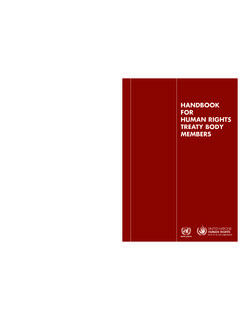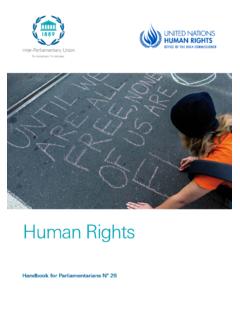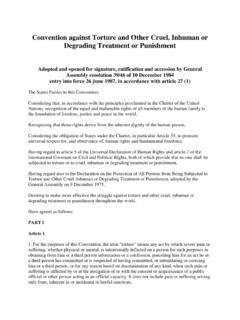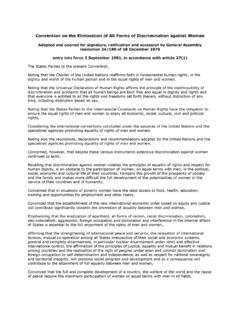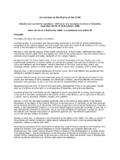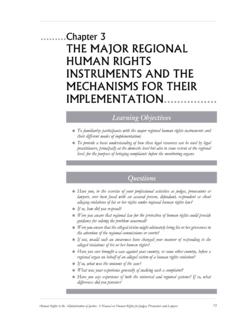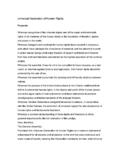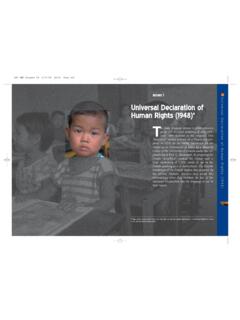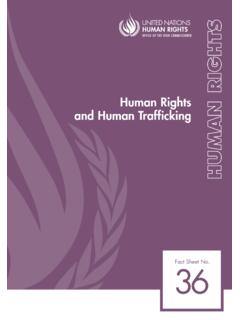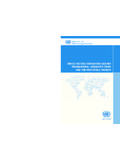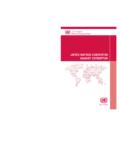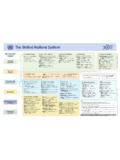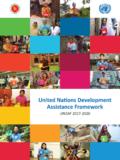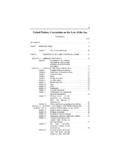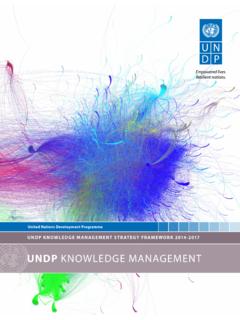Transcription of Office of the United Nations High Commissioner for Human ...
1 Office of the United Nations High Commissioner for Human Rights report on the Human rights situation in South-East Turkey July 2015 to December 2016 February 2017 Page 1 of 25 Contents I. EXECUTIVE 2 II. AN OVERVIEW OF REPORTED Human RIGHTS 5 A. Right to 7 B. Destruction and expropriation of property, including C. Right to 13 D. Enforced 14 E. Internally displaced 14 F. Physical and mental 15 G. Right to liberty and 16 H. Access to justice, fair trial and effective 18 I. Rights to freedoms of opinion and expression, to freedom of association and to participate in public 20 J. Labour 23 III. CONCLUSIONS AND 23 Page 2 of 25 I.
2 Executive Summary 1. The present report provides an overview of key Human rights concerns in South-East Turkey1 between July 2015 and 31 December 2016, particularly in relation to security operations conducted by the Government of Turkey. 2. Between July 2015 and December 2016, some 2,000 people were reportedly killed in the context of security operations in South-East Turkey. According to information received, this would include close to 800 members of the security forces, and approximately 1,200 local residents, of which an unspecified number may have been involved in violent or non-violent actions against the State. The Office of the United Nations High Commissioner for Human Rights (OHCHR) documented numerous cases of excessive use of force; killings; enforced disappearances; torture; destruction of housing and cultural heritage; incitement to hatred; prevention of access to emergency medical care, food, water and livelihoods; violence against women; and severe curtailment of the right to freedom of opinion and expression as well as political participation.
3 The most serious Human rights violations reportedly occurred during periods of curfew, when entire residential areas were cut off and movement restricted around-the-clock for several days at a time. 3. Since July 2015, when OHCHR started receiving detailed and credible allegations of serious Human rights violations taking place in South-East Turkey, several United Nations Human rights mechanisms, including Special Procedures of the Human Rights Council and Human Rights Treaty Bodies, as well as the regional Human rights mechanisms in Europe, notably the Commissioner for Human Rights of the Council of Europe, have expressed concern about the reported allegations.
4 4. In May 2016, the High Commissioner for Human Rights requested the Government of Turkey to grant a team of OHCHR Human rights officers full and unhindered access to the concerned area in order to substantiate facts and ascertain reported Human rights concerns2. OHCHR repeatedly followed up on this request but, as of February 2017, it had not received any formal reply from the Turkish 5. In June 2016, in the absence of access, the High Commissioner initiated a monitoring process based at the OHCHR Headquarters in Geneva, in furtherance of his mandate under United Nations General Assembly Resolution 48/1414. This 1 This refers to a geographic zone of the Republic of Turkey encompassing the provinces of Ad yaman, Batman, Bing l, Bitlis, Diyarbak r, Gaziantep, Hakk ri, Kahramanmara , Kilis, Malatya, Mardin, Siirt, anl urfa and irnak.
5 2 On 11 May 2016, the High Commissioner wrote a letter to the Permanent Representative of Turkey to the United Nations Office at Geneva and other international organizations in Switzerland requesting permission for an OHCHR team to conduct a monitoring mission in South-East Turkey with a view to independently examining the allegations it had received. On 22 December 2016, OHCHR reiterated its request for permission through a Note Verbale to the Permanent Representative of Turkey. 3 OHCHR acknowledges the receipt of a Note Verbale by the Permanent Mission of Turkey to the United Nations Office at Geneva and other international organizations in Switzerland dated 8 February 2017, and the invitation extended therein for the visit to Turkey of the United Nations High Commissioner for Human Rights.
6 While grateful for the invitation, OHCHR regrets the absence of an agreement by the Turkish authorities to provide access to its technical team to the affected areas in South-East Turkey. 4 The United Nations General Assembly Resolution 48/141 calls on the United Nations High Commissioner for Human Rights, inter alia, to: a) promote and protect the effective enjoyment by all of all civil, cultural, economic, political and social rights;.. f) play an active role in removing the current obstacles and in meeting the challenges to the full realization of all Human rights and in preventing the continuation of Human rights violations; g) engage in a dialogue with all Governments in the implementation of his/her mandate with a view to securing respect for all Human rights.
7 Page 3 of 25 monitoring has been conducted according to the standard OHCHR methodology. Some developments which affect the whole country, such as the response of the Government of Turkey to the 15 July 2016 coup attempt and its national counter-terrorism policies, are reflected in this report when relevant (directly or indirectly) to the situation in South-East Turkey. 6. This report is based on the information received, verified and analyzed by the OHCHR remote monitoring team. Methods of information gathering and verification included interviews with multiple victims, witnesses and relatives of victims; analysis of information provided by the Government of Turkey, as well as Turkish and international non-governmental organizations (NGOs); official records; open source documents; satellite images, video, photographic and audio materials; and other relevant and reliable materials.
8 OHCHR has exercised due diligence to corroborate, to the extent possible, the validity of the information received within the constraints of remote monitoring. OHCHR is committed to the protection of its sources and ensures the preservation of their confidentiality. It therefore does not disclose any information that may lead to the identification of sources, except with their informed consent. 7. While grateful for the information provided by the Permanent Mission of Turkey to the United Nations Office at Geneva and other international organizations in Switzerland on the situation in South-East Turkey, OHCHR regrets the absence of direct access to the affected places, people and to various Government, independent and non-governmental sources in South-East Turkey.
9 This has prevented the establishment of a dialogue and has made direct corroboration of received allegations against information available to the local authorities impossible. Thus, at the time of writing this report , OHCHR did not have the capacity to verify all allegations brought to its attention. This report therefore does not provide a comprehensive account of the Human rights situation in South-East Turkey but presents a sample of cases of concern in the area between July 2015 and December 2016. 8. The enjoyment of Human rights in South-East Turkey is further undermined by violent attacks, such as killings or kidnappings, as well as acts of terrorism which, according to Government sources, have been committed by the Kurdistan s Workers Party (PKK)5 targeting among others, members of the ruling Justice and Development Party (AKP) in the region.
10 The Government has reportedly responded by intensifying its military activity in the region, as well as by employing disproportionate security measures. This prevailing violence and insecurity is exacerbated by the political instability and deepening social divisions, and spurred on by the absence of any effective institutional platform to facilitate social dialogue in South-East Turkey. 9. It appears that the domestic protection of Human rights in South-East Turkey has effectively been non-functioning since at least July 2015, as demonstrated by the reported lack of a single investigation into the alleged unlawful killing of hundreds of people over a period of 13 months between late July 2015 and the end of August of 2016.
